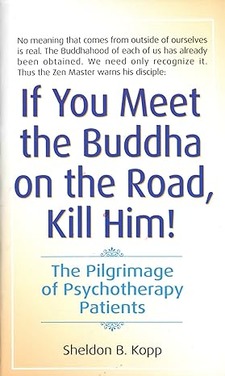“One of the luxuries of being a psychotherapist is that it helps to keep you honest. It’s a bit like remaining in treatment all of your life. It helps me to remain committed to telling and retelling my tale for the remainder of that pilgrimage that is my life. Research in self-disclosure supports my own experience that the personal openness of the guru facilitates and invites the increased openness of the pilgrim. But I operate not to help the patient, but to help myself. It is from the center of my own being that I am moved to share my tale. That it turns out to be so helpful to the patient is gravy.”
Sheldon B. Kopp, If You Meet Buddha On The Road, Kill Him! (Page 24)
“What the guru knows that the seeker does not is that we are all pilgrims. There is no master, and there is no student.”
Sheldon B. Kopp, If You Meet Buddha On The Road, Kill Him! (Page 19)
“When the Hasidic pilgrims vied for who among them had endured the most suffering who was most entitled to complain, the Zaddik told them the story of the Sorrow Tree. On the Day of Judgment, each person will be allowed to hang all of his unhappiness on a branch of the great Tree of Sorrows. After each person has found a limb from which his own miseries may dangle, they may all walk slowly around the tree. Each is to search for a set of sufferings that he would prefer to those he has hung on the tree. In the end, each man freely chooses to reclaim his own personal set of sorrows rather than those of another. Each man leaves the tree wiser than when he came.”
Sheldon B. Kopp, If You Meet Buddha On The Road, Kill Him! (Page 17)
“As a therapist, I know that though the patient learns, I do not teach. Furthermore, what is to be learned is too elusively simple to be grasped without struggle, surrender, and experiencing of how it is.”
Sheldon B. Kopp, If You Meet Buddha On The Road, Kill Him! (Page 7)
“All of the truly important battles are waged within the self. It is as if we are all tempted to view ourselves as men on horseback. The horse represents a lusty animal-way of living, untrammeled by reason, unguided by purpose. The rider represents independent, impartial thought, a sort of pure cold intelligence. too often the pilgrim lives as though his goal is to become the horseman who would break the horse’s spirit so that he can control him, so that he may ride safely and comfortably wherever he wishes to go. If he does not wish to struggle for discipline, it is because he believes that his only options will be either to live the lusty, undirected life of the riderless horse, or to tread the detached, unadventuresome way of the horseless rider. If neither of these, then he must be the rider struggling to gain control of his rebellious mount. He does not see that there will be no struggle, once he recognizes himself as a centaur.”
Sheldon B. Kopp, If You Meet Buddha On The Road, Kill Him! (Page 7)
“Though the patient enters therapy insisting that he wants to change, more often than not, what he really wants is to remain the same and to get the therapist to make him feel better. His goal is to become a more effective neurotic, so that he may have what he wants without risking getting into anything new. He prefers the security of known misery to the misery of unfamiliar insecurity.”
Sheldon B. Kopp, If You Meet Buddha On The Road, Kill Him! (Page 4)
“The therapist is an observer and a catalyst. He has no power to ‘cure’ the patient, for cure is entirely out of his hands. He can add nothing to the patient’s inherent capacity to get well, and whenever he tries to do so he meets stubborn resistance which slows up the progress of treatment. The patient is already fully equipped for getting well.”
Sheldon B. Kopp, If You Meet Buddha On The Road, Kill Him! (Page 4)
If You Meet Buddha On The Road, Kill Him! [Book]

Book Overview: A fresh, realistic approach to altering one’s destiny and accepting the responsibility that grows with freedom. No meaning that comes from outside of ourselves is real. The Buddahood of each of us has already been obtained. We only need to recognize it. “The most important things that each man must learn no one can teach him. Once he accepts this disappointment, he will be able to stop depending on the therapist, the guru who turns out to be just another struggling human being.” Using the myth of Gilgamesh, Siddhartha, The Wife of Bath, Don Quizote . . . the works of Buber, Ginsberg, Shakespeare, Karka, Nin, Dante and Jung . . . a brilliant psychotherapist, guru and pilgrim shares the epic tales and intimate revelations that help to shape Everyman’s journey through life.